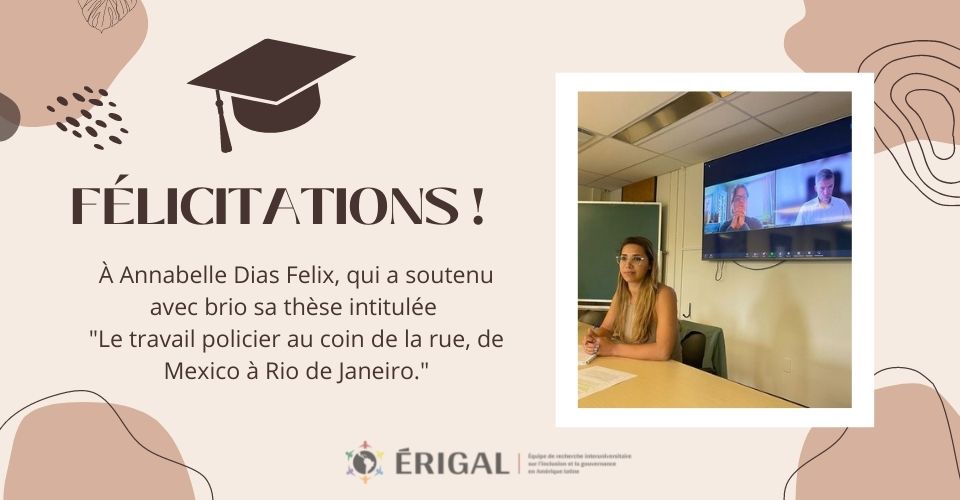Annabelle Dias Felix succesfully defends her doctoral thesis!

Congratulations to Annabelle Dias Felix, former ÉRIGAL coordinator, who brilliantly defended her thesis entitled "Police work in the streets, from Mexico City to Rio de Janeiro" on Wednesday, June 1st at Université de Montreal.
The jury was composed of:
Françoise Montambeault, Université de Montréal, co-supervisor
Camille Goirand, University of Paris 3, co-supervisor
Laurence Bherer, President-Rapporteur
Massimilio Mulone, member of the jury
Jacques de Maillard, external examiner
Étienne Blais, dean's representative
In the 1990s, Latin-American governments put preventive approaches to public security on the agenda, declaring them to be more respectful of human rights and more effective in reducing criminal acts and delinquency. Since then, community-oriented police programs (COPs) have been implemented in several countries in the region. However, the observed field experiences of these COPs are varied. Some cases seem to reproduce systemic violence while others seem to contribute to improving relations with the populations. Why such a variation? To answer this question, this thesis is based on a 9-month ethnographic study in the heart of the local implementation of the COPs in Brazil and Mexico. In Brazil, the field study was conducted in Rio de Janeiro, in the favela of Cantagalo Pavão-Pavãozinho as well as the group of favelas of Maré. In Mexico, the observations were focused on the neighborhood of Tepito, in the city of Mexico and the municipality of Nezahualcóyotl, in the state of Mexico. While the COPs in these areas are comparable, the daily experiences are different especially with regard to the police practices considered respectful of human rights by the inhabitants of the respective areas. This thesis starts by first laying out the historic institutional and political logics underlying the police practices observed on the field. The analysis then shifts to the perspective of the inhabitants. The thesis demonstrates that police practices occur in interaction with a local context and distinct local social configurations. The police officers do not insert themselves into a social vacuum when a program is implemented, and they cannot ignore the pre-existing context. This pre-existing local context and complex network of interactions helps to understand the variation observed on the field amongst the different cases. Thus, the thesis invites the reader to (re)consider the implementation of COPs as a complex and dynamic process, whose results depend also on the interactions between local governments, police institutions, police officers on the field and inhabitants within local social configurations.
A huge congratulations to her for this beautiful defense!


